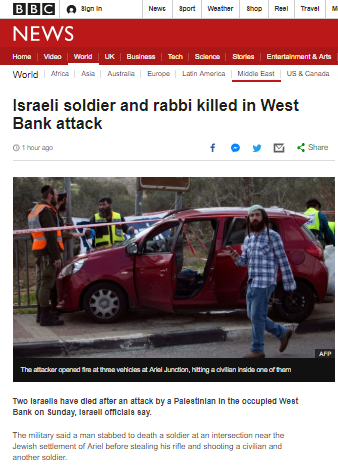On the afternoon of December 22nd (before news broke of Egypt’s withdrawal of its draft resolution tabled at the UN Security Council) listeners to the BBC World Service radio programme ‘Newshour’ heard a report (from 50:04 here) relating to that story.
Presenter James Coomarasamy introduced the item as follows: [all emphasis in bold added]
JC: “The US president-elect Donald Trump has called for a UN Security Council resolution aimed at halting the building of Israeli settlements to be vetoed. The draft resolution is meant to put an end to all settlement activity by Israel in the occupied Palestinian territories including East Jerusalem. Well, joining us now on the line from Washington DC is the BBC’s Barbara Plett Usher. Ehm…so Barbara; this is meant to be voted on a bit later on today – is that right?”
Plett Usher responded:
BPU: “Yes; it’s a draft resolution put forward by Egypt which would say that Jewish settlements in occupied East Jerusalem and the Palestinian…rest of the Palestinian territories are illegal. Now, UN resolutions already say that….eh…but there has been some push to get…ehm…it out there again and re-in…re…re-supported by the UN because of the…this particular Israeli government has…has done a lot of settlement building and it is…it’s very much its policy.”
JC: “And what about the Obama administration’s policy? What do we know about its thoughts on this draft resolution?”
BPU: “The Obama administration and the United States generally has said that settlement building lacks legitimacy. It stops short of adopting the position that it is illegal under international law but Mr Obama’s administration has been very, very critical of the settlement building during his administration and he has…and some of his advisors and his officials have said it was…contributed to breakdown in the peace talks. So there’s been a lot of speculation that in the final month of his…of his term he might take some sort of step, some sort of parting shot, to put his own stamp on what he thinks Israel – Palestinian peace should look like or what the parameters might be or what the problems might be and so there’s been some speculation he might take action at the UN. Up until now…eh…the Americans have vetoed any resolution critical of Israel and the Obama administration did that too in 2011 exactly on a resolution involving settlements. But because he’s leaving, because of his contentious relationship with the Israelis, because Mr Trump is coming after him and looks like he will be changing policy or could change policy…ahm…there’s speculation that he might vote differently this time.”
JC: “So briefly, Barbara, what should we make of the president elect’s intervention?”
BPU: “It’s consistent with what he’s done so far. During the campaign his advisors…ahm…were very sceptical of a two state solution. He has appointed an ambassador as his nominee who is a hardline pro-settler…ah…views. Ahm…so I think that’s consistent with what we’ve seen.”
As we see, in that two and a half-minute conversation, listeners heard two references to “settlements” in “Palestinian territories”. The BBC Academy’s ‘style guide’ states that:
“Strictly speaking, the phrase ‘Palestinian Territories’ refers to the areas that fall under the administration of the Palestinian Authority…”
Obviously there are no Israeli ‘settlements’ in those areas and so the use of such inaccurate terminology misleads listeners.
Israeli communities do exist in Area C and in parts of Jerusalem previously occupied by Jordan for nineteen years. Under the terms of the Oslo Accords no limits are placed on construction in those regions and their final status is to be determined in negotiations. Listeners to this item, however, were not provided with that all-important context and the language used by Plett Usher and Coomarasamy clearly endorses and promotes the Palestinian side’s political claims and narrative, thereby compromising BBC impartiality.
Listeners also heard several references to “settlement building”. Just last September the BBC News website amended similarly misleading language – which leads BBC audiences to mistakenly believe that Israel is constructing new communities rather than – as is actually the case – houses being built in existing towns and villages – most of which would under any reasonable scenario remain under Israeli control in the event of an agreement.
Plett Usher’s claim that “this particular Israeli government has…has done a lot of settlement building” does not stand up to scrutiny and does not clarify to audiences the existence of what Ha’aretz earlier this year termed “an informal construction freeze”.
It is by no means surprising to see the BBC continuing to push its well-worn but unabashedly partisan mantra on the topic of ‘settlements’ – the corporation has, after all, embraced that editorial line for years. However, as this report once again demonstrates, that editorial policy hinders audience understanding of both this specific story and the issue in general.
Related Articles:
BBC News amends misleading portrayal of Israeli construction
BBC News pushes settlements narrative in report on another topic
The BBC’s inaccurate and misleading representation of Israeli building – part two
BBC News continues to cultivate its settlements narrative
Examining the BBC’s claim that Israeli building endangers the two state solution
The return of the BBC’s political narrative on Israeli construction




